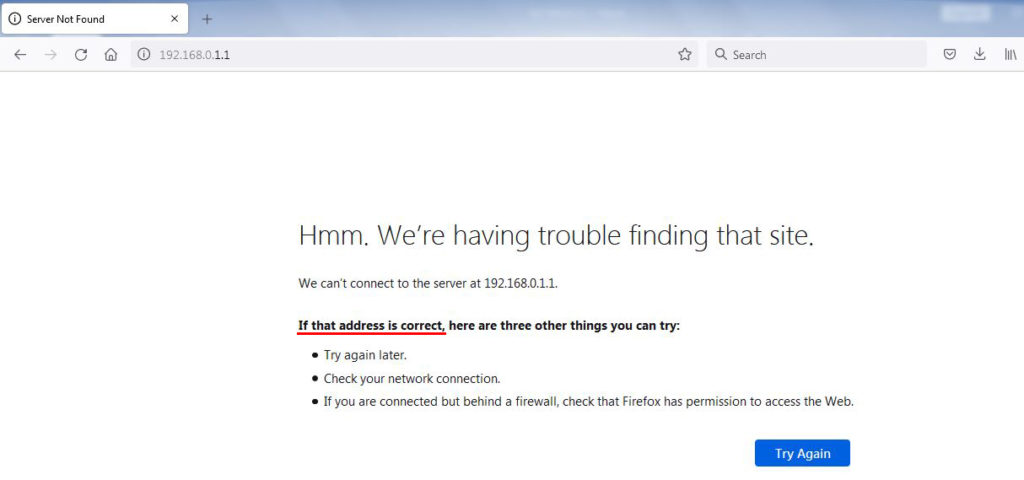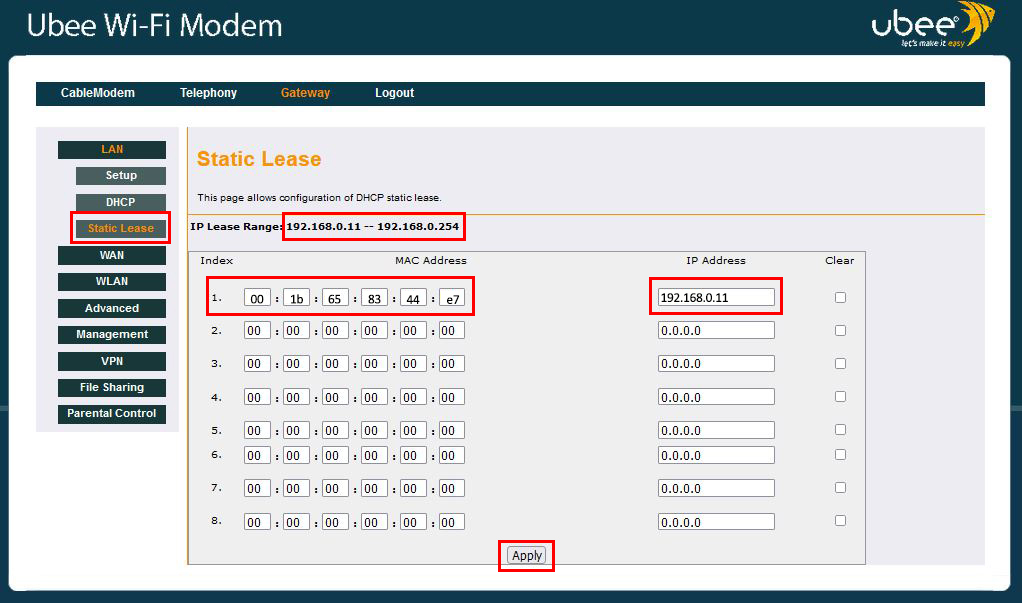Have you just tried to enter the address from the title in your browser and got a message like in the picture below? Well, that’s because 192.168.0.1.1 is not a valid IP address. Addresses like this one can cause a lot of confusion, but it’s all easily solvable. You just have to read this article, and you’ll get all the answers you’re looking for.

CONTENTS
- What Are IP Addresses and Why Do We Need Them?
- Is 192.168.0.1.1 a Valid IP address?
- What Kind of Address is 192.168.0.1.1?
- What is the Purpose of a Private IP Address?
- Dynamic and Static IP Addresses
- Is 192.168.0.1.1 My Default Gateway?
- Can This Address Be Assigned to My PC/phone? Can It Be a Host Address?
- How to Make This Address Static?
What Are IP Addresses and Why Do We Need Them?
IP addresses are crucial for communication between various devices connected to a network. They are like phone or street numbers. If you have a phone, but don’t have a phone number (SIM card), people will not be able to reach you. If you have a home, but your home doesn’t have a number, a package sent to you will never reach the destination. It’s the same with IP addresses. They are assigned to every device connected to a network (whether it’s a LAN network, larger corporate network, or the Internet). Without an IP address, your devices would never be able to connect to any network. Even if they somehow connect, they wouldn’t be able to communicate with other devices, access the internet, or visit a website.
The rules that define how IP addresses should look like and how the process of assigning IP addresses works are called IP protocols. The protocol that is currently in use is IPv4.
According to IPv4 protocol, every IP address is a unique array of 32 bits (32 0s and 1s). This array of 32 bits is divided into 4 groups (aka octets), and each octet consists of 8 bits. But we don’t see a bunch of zeros and ones when we see an IP address. That’s what computers, routers, and servers see. What we see is – four numbers separated by dots. That’s because every octet (a set of 8 zeros and ones) can be decoded into a number between 0 and 255. So, 0.0.0.0 is an example of an IP address. 255.255.255.255 is also an IP address. 10.1.1.1 and 192.168.0.1 are both IP addresses.
Similar Articles:
The total number of IPv4 addresses that you can create with 32 bits is 4.3 billion. It seems a lot, but the creators of IPv4 protocols have already had to introduce some changes to the protocol to extend its life because there are more than 10 billion devices in the world connected to the internet.
To extend the life of IPv4, the creators of the protocol have divided all the addresses into 5 classes (each class for a different purpose). The creators of the IPv4 protocol have also designed blocks of private addresses (for use on private networks). Finally, they have introduced static and dynamic addresses.

To recap – every IP address is an array of 4 numeric values, each ranging from 0 to 255. Each IP address comes from a certain class (A-E), it is either public or private, and it can be dynamic or static.
Is 192.168.0.1.1 a Valid IP address?
What’s wrong with this address? We’ve just said that a valid IP address consists of four numeric values. But this one has 5. So, 192.168.0.1.1 is not a valid IP address. One number is redundant. So, the real address, the one you needed is 192.168.0.1. Or, maybe you misspelled the address and added a dot where you weren’t supposed to – maybe the address you are looking for is 192.168.0.11. Those two are the best answers we can think of.
What Kind of Address is 192.168.0.1.1?
If you look at the table above, you will see that the address that starts with 192.168 belongs to class C and that it’s a private address. As you already know, 192.168.0.1.1 is not a valid IP address, but it’s supposed to be a private address from block C. Both of our suggestions from the previous section (192.168.0.1 and 192.168.0.11) are also class C private addresses.
What is the Purpose of a Private IP Address?
Private addresses are designed for use on private networks (like your home wi-fi network, for example). They can only be seen on that network and are not used for communication on the internet (they are not routable online).
The fact that a device on your network has one IP address (let’s say 192.168.0.11) doesn’t mean that a device on some other private network (any other private network) can’t use the same address. In fact, the exact same address can be used on countless other networks. If the devices are connected to different networks, there will be no problem. The only rule is – every device on a single private LAN network must have a unique IP address within that network.
Remember the story about prolonging the life of the IPv4 protocol. Private addresses are one way of doing so – a single IP address can be (re)used an unlimited number of times on an unlimited number of networks. If you check the label on your router, there’s a great chance that you will see this address – 192.168.0.1. This is, by far, the most common default IP address and is used by countless routers all over the world.
Dynamic and Static IP Addresses
Every private address can be dynamic or static. In a typical home network, our devices get IP addresses from our routers. They are in charge of assigning IP addresses. Every router has one address preassigned to it by the manufacturer (like 192.168.0.1). Your router also has a predefined scope of IP addresses (usually the addresses from the same subnet as the default IP). This scope is called the DHCP pool. Your router will assign one of the addresses from this scope to every device connected to it. For example, if your router’s default IP is 192.168.0.1, the DHCP pool will span from 192.168.0.2 to 192.168.0.254. The first device connected to your router will get 192.168.0.2, the second will get 192.168.0.3, and so on.
If the IP address is assigned to your device automatically, it’s considered dynamic. The term dynamic describes the nature of that address (or rather the nature of the assignment process). Dynamic addresses are not permanently assigned, and your device will not always get the same IP address when connected. Dynamic addresses are just leased (borrowed, if you want). There’s a predefined lease period. When the period expires, the router will try to communicate with your device and check if it’s still connected. If it is, the lease will be renewed (the device will keep using the same address). If it’s not, the address goes back to the pool and will be assigned to the next device that you or someone else connect to the network. It can be the same device, but it can also be some other device. That’s why we called the address dynamic.
Any private IP address can also be static. That means that one IP address scan be permanently assigned to one device. But the router can’t do that on its own. In other words, you have to make the address static manually. You can do that through your device’s settings or you can open your router’s settings and make a DHCP reservation. Once you do that, your device will always have the same IP address.
Is 192.168.0.1.1 My Default Gateway?
Default Gateway or default IP is the address assigned to your router. It is, by default, a static IP address, and it’s assigned to your router by the manufacturer. Now, let’s see if the address from our title can be your default gateway.
192.168.0.1.1 is definitely not your default gateway because it’s not a valid IP address. The other two addresses that we’ve just talked about (192.168.0.1 and 192.168.0.11) could be your default gateways. 192.168.0.1 is often used by various manufacturers, so there’s a great chance that your router uses this address as a default gateway. If you’re using a Luxul range extender or access point (XVW-P30, XAP-1020, XVW-P30E), then there’s a chance that your default gateway is 192.168.0.11.
If you don’t know what your default gateway is, you can easily check your default IP on the same device that you’re using to read this article. For a step-by-step tutorial on how to check your default IP, read our guide.
Can This Address Be Assigned to My PC/phone? Can It Be a Host Address?
Once again, 192.168.0.1.1 is not a valid IP. It cannot be your default gateway and it cannot be a host IP address. The other two addresses that look a lot like the one from the title are a different story.
192.168.0.1 is the first available address in the 192.168.0.0/24 subnet and it’s usually reserved for the router. So, it can hardly be assigned to some of your devices (it can hardly be a host IP).
192.168.0.11 can easily be one of the available addresses in your DHCP pool, and it can be a host IP – it can be assigned to some of the devices connected to your home wi-fi.
Like any other private IP address, 192.168.0.11 can be static or dynamic. If you don’t mind having a different address assigned to your device every time you connect to the network, you don’t have to do anything. Just let the router do its job, and the address will be dynamic.
How to Make This Address Static?
Here’s what you have to do if you want to make 192.168.0.11 static. We will assume that you’re using a router with a 192.168.0.1 default IP. The DHCP pool spans from 192.168.0.2 to 192.168.0.254. One of the available addresses in the pool is 192.168.0.11.
The most secure way to do this is to open your router’s configuration page. To do that, you will have to type in the default IP in your browser and log in (for that, you need your router’s username and password).
Once you open the settings, you have to look for DHCP settings and DHCP pool (it’s usually found within LAN settings). Some routers may have a separate tab named static IP or DHCP reservation.
Once you open the DHCP reservation tab, you will have to enter the MAC address of your device (the one that you want to have a static IP address), and you will have to choose the address. Once you enter MAC and IP address, you can click Save or Apply and log out. You may also need to restart the router.

How to make a DHCP reservation

Hey, I’m Jeremy Clifford. I hold a bachelor’s degree in information systems, and I’m a certified network specialist. I worked for several internet providers in LA, San Francisco, Sacramento, and Seattle over the past 21 years.
I worked as a customer service operator, field technician, network engineer, and network specialist. During my career in networking, I’ve come across numerous modems, gateways, routers, and other networking hardware. I’ve installed network equipment, fixed it, designed and administrated networks, etc.
Networking is my passion, and I’m eager to share everything I know with you. On this website, you can read my modem and router reviews, as well as various how-to guides designed to help you solve your network problems. I want to liberate you from the fear that most users feel when they have to deal with modem and router settings.
My favorite free-time activities are gaming, movie-watching, and cooking. I also enjoy fishing, although I’m not good at it. What I’m good at is annoying David when we are fishing together. Apparently, you’re not supposed to talk or laugh while fishing – it scares the fishes.
